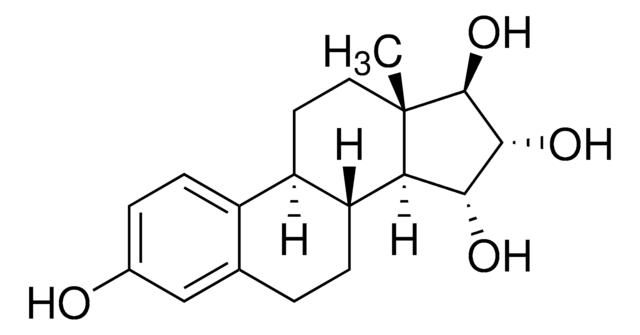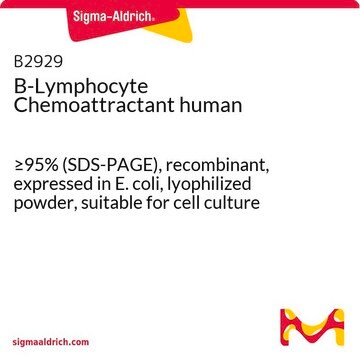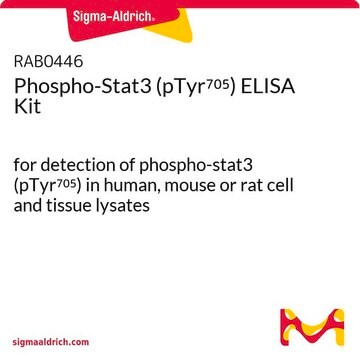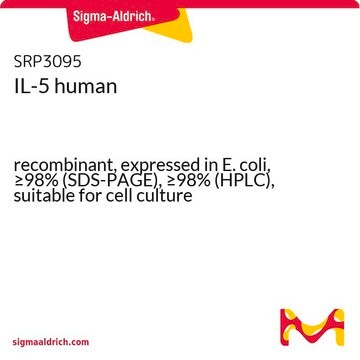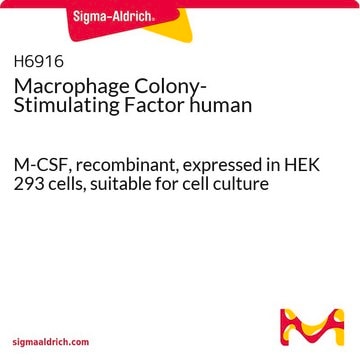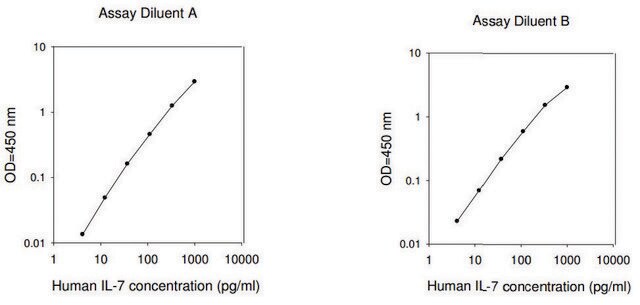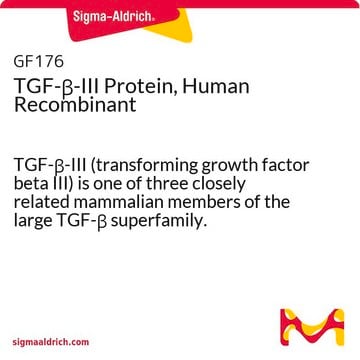SRP3212
IL-5 from mouse
recombinant, expressed in E. coli, ≥98% (SDS-PAGE), ≥98% (HPLC), suitable for cell culture
Synonym(s):
BCDFII, EDF, TRF
Sign Into View Organizational & Contract Pricing
All Photos(1)
About This Item
UNSPSC Code:
12352202
NACRES:
NA.32
Recommended Products
biological source
mouse
recombinant
expressed in E. coli
Assay
≥98% (HPLC)
≥98% (SDS-PAGE)
form
lyophilized
potency
≤2.0 ng/mL ED50
mol wt
26.2 kDa
packaging
pkg of 25 μg
technique(s)
cell culture | mammalian: suitable
impurities
<0.1 EU/μg endotoxin, tested
color
white to off-white
UniProt accession no.
shipped in
wet ice
storage temp.
−20°C
Gene Information
mouse ... IL5(16191)
General description
IL-5 (interleukin 5) is a Th2 (T helper 2) cytokine that is predominantly produced by T lymphocytes, and to a lower extent by mast cells, type 2 innate lymphoid (ILC2) cells, and eosinophils.
Recombinant murine IL-5 is a 26.2kDa disulfide-linked homodimeric protein containing two 113 amino acid chains.
Recombinant murine IL-5 is a 26.2kDa disulfide-linked homodimeric protein containing two 113 amino acid chains.
Biochem/physiol Actions
IL-5 (interleukin 5) was initially identified as a stimulant of antibody production by activated B cells. It has recently been shown to be a key factor in eosinophil differentiation and proliferation. It is also implicated in the pathogenesis of asthma, atopy, hypereosinophilic syndromes, and parasitic infections. In distal lung, IL-5 recruits eosinophils and modulates inflammatory or immune cells in the microenvironment, thus, promoting lung metastasis in cancer.
Sequence
MEIPMSTVVK ETLTQLSAHR ALLTSNETMR LPVPTHKNHQ LCIGEIFQGL DILKNQTVRG GTVEMLFQNL SLIKKYIDRQ KEKCGEERRR TRQFLDYLQE FLGVMSTEWA MEG
Physical form
Lyophilized from 10 mM Sodium Phosphate, pH 7.5.
Reconstitution
Centrifuge the vial prior to opening. Reconstitute in water to a concentration of 0.1-1.0 mg/ml. Do not vortex. This solution can be stored at 2-8°C for up to 1 week. For extended storage, it is recommended to further dilute in a buffer containing a carrier protein (example 0.1% BSA) and store in working aliquots at -20°C to -80°C.
Storage Class Code
11 - Combustible Solids
WGK
WGK 3
Flash Point(F)
Not applicable
Flash Point(C)
Not applicable
Certificates of Analysis (COA)
Search for Certificates of Analysis (COA) by entering the products Lot/Batch Number. Lot and Batch Numbers can be found on a product’s label following the words ‘Lot’ or ‘Batch’.
Already Own This Product?
Find documentation for the products that you have recently purchased in the Document Library.
Interleukin-5 facilitates lung metastasis by modulating the immune microenvironment.
Zaynagetdinov R et al
Cancer Research, 75(8), 1624-1634 (2015)
Interleukin-5, eosinophils, and disease.
C J Sanderson
Blood, 79(12), 3101-3109 (1992-06-15)
H D Campbell et al.
Proceedings of the National Academy of Sciences of the United States of America, 84(19), 6629-6633 (1987-10-01)
The human eosinophil differentiation factor (EDF) gene was cloned from a genomic library in lambda phage EMBL3A by using a murine EDF cDNA clone as a probe. The DNA sequence of a 3.2-kilobase BamHI fragment spanning the gene was determined.
Stefan Rebhandl et al.
European journal of immunology, 44(7), 2175-2187 (2014-03-29)
Activation-induced deaminase (AID) is a DNA-mutating enzyme that mediates class-switch recombination as well as somatic hypermutation of antibody genes in B cells. Due to off-target activity, AID is implicated in lymphoma development by introducing genome-wide DNA damage and initiating chromosomal
Xiang Zhu et al.
American journal of physiology. Gastrointestinal and liver physiology, 306(11), G974-G982 (2014-04-20)
Extracellular acidification has been observed in allergic inflammatory diseases. Recently, we demonstrated that the proton-sensing receptor G protein-coupled receptor 65 (GPR65) regulates eosinophil survival in an acidic environment in vitro and eosinophil accumulation in an allergic lung inflammation model. For
Our team of scientists has experience in all areas of research including Life Science, Material Science, Chemical Synthesis, Chromatography, Analytical and many others.
Contact Technical Service